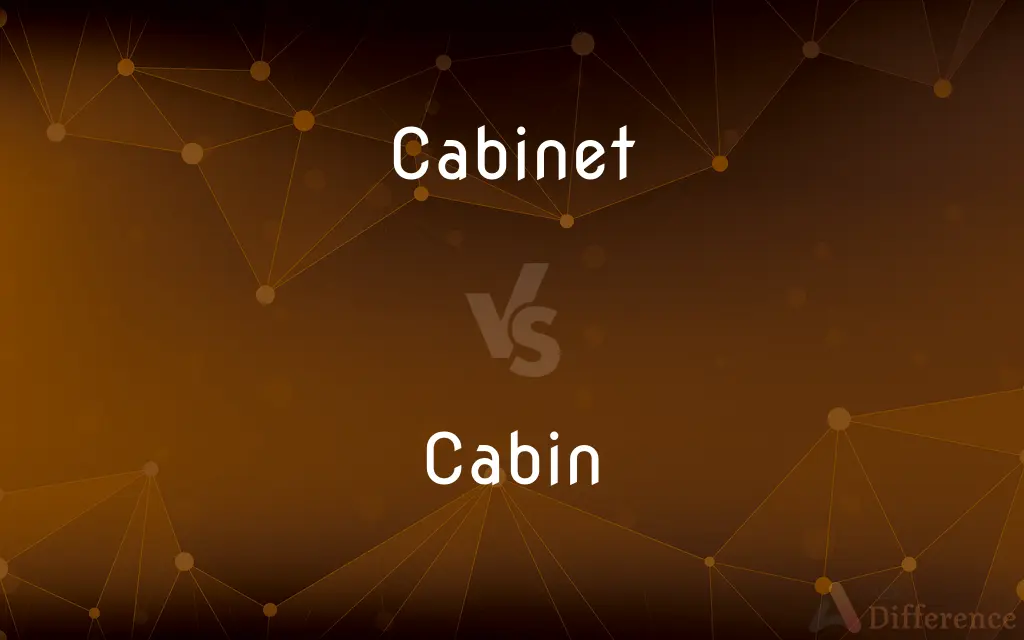Cabinet vs. Cabin — What's the Difference?
By Tayyaba Rehman & Maham Liaqat — Updated on March 28, 2024
Cabinets are storage units used indoors, often for organizing items, whereas cabins are small, simple shelters or houses, typically situated in rural or natural settings.

Difference Between Cabinet and Cabin
Table of Contents
ADVERTISEMENT
Key Differences
Cabinets are designed for storage within homes or offices, equipped with shelves, drawers, or compartments for organizing various items, from kitchenware to documents. They can be made from a variety of materials including wood, metal, and plastic, and are often found in kitchens, bathrooms, and bedrooms. While cabinets serve a functional role in organizing and storing items, they also contribute to the aesthetic of the space they are in. Cabins, on the other hand, are small, rustic shelters or houses, usually located in a natural or semi-natural setting outside urban areas. They are often made of wood and designed to blend with the natural environment. Cabins are primarily used for recreational purposes, such as holiday retreats or hunting lodges, providing a simple and serene place to stay away from the hustle and bustle of city life.
While cabinets are an integral part of interior design and functionality, enhancing the organization and appearance of indoor spaces, cabins offer a retreat into nature, symbolizing escape and simplicity. The primary function of cabinets is to store and organize, whereas cabins provide a place to live or stay temporarily.
Materials and construction techniques differ significantly between cabinets and cabins. Cabinets may utilize a range of materials including wood, metal, and glass, tailored to specific storage needs and aesthetic preferences. Cabins are typically constructed from wood, stone, or logs, emphasizing durability and harmony with the natural surroundings.
In terms of usage and location, cabinets are ubiquitous in residential and commercial buildings, essential for storage and organization. Cabins, however, are situated in more secluded areas, serving as vacation homes, retreats, or temporary accommodations in natural settings.
Comparison Chart
Purpose
Storage and organization of items within a space.
Providing a simple, rustic shelter or accommodation.
ADVERTISEMENT
Location
Indoors, in various rooms like kitchens or offices.
Outdoors, often in rural or natural settings.
Construction
Made from wood, metal, glass, or plastic.
Primarily constructed from natural materials like wood.
Usage
Organizing items like dishes, clothes, or documents.
Recreational or temporary living, often for vacations.
Design Influence
Influences the interior aesthetic of buildings.
Designed to blend with and respect the natural environment.
Compare with Definitions
Cabinet
A piece of furniture with shelves or drawers for storing or displaying items.
She placed her fine china in the glass-fronted cabinet.
Cabin
The interior of a boat, aircraft, or spacecraft.
The flight attendant welcomed passengers into the cabin.
Cabinet
A private room.
The director retreated to his cabinet for a confidential phone call.
Cabin
A small, simple room to sleep in on a ship.
The sailor returned to his cabin after his watch ended.
Cabinet
A protective case or enclosure.
The museum displayed ancient manuscripts in a climate-controlled cabinet.
Cabin
An office or small room, especially used for professional consultations.
The consultant waited for her client in her cabin.
Cabinet
A body of high-ranking state officials, typically representing the executive branch of government.
The president held a meeting with his cabinet to discuss the policy changes.
Cabin
A small wooden shelter or house in a wild or remote area.
They spent their vacation in a cozy cabin by the lake.
Cabinet
A storage unit used in various settings, such as kitchens or offices.
He organized his documents in the filing cabinet by category.
Cabin
A compartment for passengers or crew on a transport vehicle.
The train’s sleeping cabin was surprisingly comfortable.
Cabinet
(Archaic) A small or private room set aside for a specific activity.
Cabin
A private room or compartment on a ship
She lay in her cabin on a steamer
Cabinet
An upright, cupboardlike repository with shelves, drawers, or compartments for the safekeeping or display of objects.
Cabin
A small wooden shelter or house in a wild or remote area
The cabin lay three miles into the reserve
Cabinet
(Computers) The box that houses the main components of a computer, such as the central processing unit, disk drives, and expansion slots.
Cabin
A cubicle or individual work space within a larger office.
Cabinet
Often Cabinet A body of persons appointed by a head of state or a prime minister to head the executive departments of the government and to act as official advisers.
Cabin
Confine within narrow bounds
Once loosed, the idea of equality is not easily cabined
Cabinet
Rhode Island & Southeastern Massachusetts See milkshake.
Cabin
A small, roughly built house or shelter.
Cabinet
Suitable for storage or display in a cabinet, as because of size or decorative quality.
Cabin
A room in a ship used as living quarters by an officer or passenger.
Cabinet
Of, relating to, or being a member of a governmental cabinet
Cabinet matters.
A cabinet minister.
Cabin
An enclosed compartment in a boat that serves as a shelter or as living quarters.
Cabinet
Used in the making of cabinets
Teak and other heavy cabinet wood.
Cabin
The enclosed space in an aircraft or spacecraft for the crew, passengers, or cargo.
Cabinet
A storage closet either separate from, or built into, a wall.
Cabin
To confine or live in or as if in a small space or area.
Cabinet
A cupboard.
Cabin
(US) A small dwelling characteristic of the frontier, especially when built from logs with simple tools and not constructed by professional builders, but by those who meant to live in it.
Abraham Lincoln was born in a log cabin.
Cabinet
The upright assembly that houses a coin-operated arcade game, a cab.
Cabin
(informal) A chalet or lodge, especially one that can hold large groups of people.
Cabinet
(historical) A size of photograph, specifically one measuring 3⅞" by 5½".
Cabin
A private room on a ship.
The captain's cabin:
Passengers shall remain in their cabins.
Cabinet
A group of advisors to a government or business entity.
Cabin
The interior of a boat, enclosed to create a small room, particularly for sleeping.
Cabinet
In parliamentary and some other systems of government, the group of ministers responsible for creating government policy and for overseeing the departments comprising the executive branch.
Cabin
The passenger area of an airplane.
Cabinet
(Kentucky) A cabinet-level agency in the executive branch; that is, an agency headed by a member of the governor's cabinet.
Cabin
The section of a passenger plane having the same class of service.
Cabinet
(archaic) A small chamber or private room.
Cabin
A signal box.
Cabinet
(often capitalized) A collection of art or ethnographic objects.
Cabin
A small room; an enclosed place.
Cabinet
Milkshake.
Cabin
(Indian English) A private office; particularly of a doctor, businessman, lawyer, or other professional.
Cabinet
(obsolete) A hut; a cottage; a small house.
Cabin
(transitive) To place in a cabin or other small space.
Cabinet
An enclosure for mechanical or electrical equipment.
Cabin
(by extension) To limit the scope of.
Cabinet
A hut; a cottage; a small house.
Hearken a while from thy green cabinet,The rural song of careful Colinet.
Cabin
To live in, or as if in, a cabin; to lodge.
Cabinet
A small room, or retired apartment; a closet.
Cabin
A cottage or small house; a hut.
A hunting cabin in the west.
Cabinet
A private room in which consultations are held.
Philip passed some hours every day in his father's cabinet.
Cabin
A small room; an inclosed place.
So long in secret cabin there he heldHer captive.
Cabinet
The advisory council of the chief executive officer of a nation; a cabinet council.
Cabin
A room in ship for officers or passengers.
Cabinet
A set of drawers or a cupboard intended to contain articles of value. Hence:
Cabin
To live in, or as in, a cabin; to lodge.
I'll make you . . . cabin in a cave.
Cabinet
Any building or room set apart for the safe keeping and exhibition of works of art, etc.; also, the collection itself.
Cabin
To confine in, or as in, a cabin.
I am cabined, cribbed, confined, bound inTo saucy doubts and fears.
Cabinet
Suitable for a cabinet; small.
He [Varnhagen von Ense] is a walking cabinet edition of Goethe.
Cabin
Small room on a ship or boat where people sleep
Cabinet
To inclose
Cabin
A small house built of wood; usually in a wooded area
Cabinet
A cupboard-like repository or piece of furniture with doors and shelves and drawers; for storage or display
Cabin
The enclosed compartment of an aircraft or spacecraft where passengers are carried
Cabinet
Persons appointed by a head of state to head executive departments of government and act as official advisers
Cabin
Confine to a small space, such as a cabin
Cabinet
A storage compartment for clothes and valuables; usually it has a lock
Cabinet
Housing for electronic instruments, as radio or television
Common Curiosities
What is a cabinet?
A cabinet is a storage unit found indoors, designed with shelves or drawers to organize and store various items.
Are cabinets considered furniture?
Yes, cabinets are often considered a type of furniture, especially when they are freestanding and movable.
What is a cabin?
A cabin is a small, simple shelter or house, typically made of wood and located in natural or remote settings.
Can cabins be found in urban areas?
While cabins are traditionally located in rural or natural areas, some urban settings might offer cabin-like accommodations for thematic or stylistic purposes.
Do cabinets only serve a functional purpose?
No, cabinets also play an important role in interior design, contributing to the aesthetic of the space.
How do cabinets and cabins differ in purpose?
Cabinets are used for storage and organization within indoor spaces, while cabins provide rustic accommodations or shelters in natural settings.
Are there different types of cabinets?
Yes, there are various types of cabinets, including kitchen cabinets, bathroom cabinets, and filing cabinets, each designed for specific storage needs.
Is a cabin always made of wood?
While wood is the traditional material for cabin construction, modern cabins may also incorporate other materials for style or sustainability.
What role does design play in the construction of cabins?
Design is crucial in cabin construction to ensure the structure blends with the natural environment and meets the specific needs of its occupants.
What materials are typically used to build cabins?
Cabins are commonly constructed from natural materials like wood, logs, or stone to blend with their natural surroundings.
Can cabins be used as permanent homes?
While cabins are often used for temporary or vacation purposes, they can also serve as permanent residences for some people.
How do cabinets enhance the functionality of indoor spaces?
Cabinets improve indoor spaces by providing organized storage solutions, thus reducing clutter and making items easily accessible.
How do construction techniques differ between cabinets and cabins?
Cabinet construction can involve a range of materials and techniques tailored to indoor use, while cabin construction emphasizes natural materials and durability.
What distinguishes a cabin from a cottage?
Cabins are typically simpler and more rustic than cottages, which may offer more amenities and comfortable living spaces.
Can cabinets be built into a wall?
Yes, many cabinets, especially in kitchens and bathrooms, are built into walls to save space and integrate seamlessly with the room’s design.
Share Your Discovery

Previous Comparison
Reactionary vs. Revolutionary
Next Comparison
Mridangam vs. TablaAuthor Spotlight
Written by
Tayyaba RehmanTayyaba Rehman is a distinguished writer, currently serving as a primary contributor to askdifference.com. As a researcher in semantics and etymology, Tayyaba's passion for the complexity of languages and their distinctions has found a perfect home on the platform. Tayyaba delves into the intricacies of language, distinguishing between commonly confused words and phrases, thereby providing clarity for readers worldwide.
Co-written by
Maham Liaqat















































